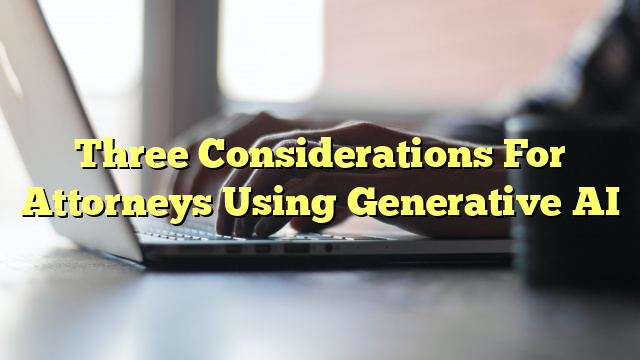Introduction
Generative AI (Artificial Intelligence) is a powerful technology that has the potential to transform the legal profession. Generative AI can help lawyers identify patterns in large data sets, analyze complex legal issues, and better understand their clients’ needs. It can also enable lawyers to automate mundane tasks and more quickly identify solutions to difficult legal problems. However, the legal profession is still in the early stages of understanding and utilizing generative AI, and there are a number of legal and ethical considerations that attorneys must consider as they implement the technology. In this article, we will explore three key considerations that attorneys should be aware of when using generative AI.
Risks Associated With Generative AI
The use of generative AI poses several risks both for attorneys and their clients. One of the most significant risks associated with generative AI is the potential for bias. Generative AI relies on data to make decisions and can be easily influenced by bias in the data. If the data used to train the AI contains bias or inaccurate information, the AI will be unable to make accurate decisions. Additionally, the AI’s decisions may reflect the personal biases of those who built the AI. Therefore, attorneys need to be aware of the potential for bias and take steps to ensure that the AI is accurately trained on unbiased data sets.
Another risk associated with generative AI is privacy. Generative AI systems are often used to store and process confidential and sensitive information. If the AI system is not properly secured, it could expose confidential information to unauthorized parties. Therefore, attorneys need to be sure to take proper steps to safeguard their clients’ data.
Finally, attorneys need to be aware of potential legal risks associated with generative AI. Some legal systems, such as the European Union’s General Data Protection Regulation (GDPR), have specific rules regarding the use of AI. Failure to comply with these laws could result in significant legal consequences. Therefore, attorneys need to be knowledgeable about the laws applicable to the use of AI in their jurisdiction.
Importance of Generative AI
Despite the risks associated with generative AI, there are also many benefits that attorneys can receive from utilizing the technology. Generative AI can be used to automate tasks such as searching for legal precedents or drafting legal documents. This can help to reduce the amount of time attorneys need to spend on mundane tasks and allow attorneys to focus on more important matters. Additionally, AI can be used to analyze large datasets and identify patterns that can be used to inform legal strategy. Furthermore, generative AI can be used to identify potential areas of risk, such as contract clauses that could be used against a client.
Generative AI can also help attorneys better understand their clients’ needs. AI can be used to analyze a client’s data and provide insights into their goals and objectives. This can help attorneys to better understand their clients and craft legal strategies that are tailored to their specific needs.
Impact of Generative AI on Lawyers
Generative AI will have a significant impact on the legal profession. AI can automate mundane tasks such as document review, freeing up lawyers to focus on more complex matters. However, AI will also require lawyers to develop new skills and expertise. Lawyers will need to learn to use AI tools, understand how to evaluate the results, and develop strategies to mitigate legal risks. Lawyers will also need to understand how AI can be used ethically and in compliance with applicable laws.
Uses of AI in the Legal Profession
Generative AI is already being used in a number of ways in the legal profession. AI can be used to automate tasks such as searching for legal precedents or drafting legal documents. AI can also be used to analyze data sets and identify patterns that can be used to inform legal strategy. Additionally, AI can be used to identify potential areas of risk or to gain insights into a client’s needs.
Overall, generative AI has the potential to transform the legal profession. However, attorneys need to be aware of the legal and ethical risks associated with the technology and take steps to ensure that it is used responsibly. By understanding the potential benefits and risks associated with generative AI, attorneys can use the technology to their advantage and ensure the best outcomes for their clients.

